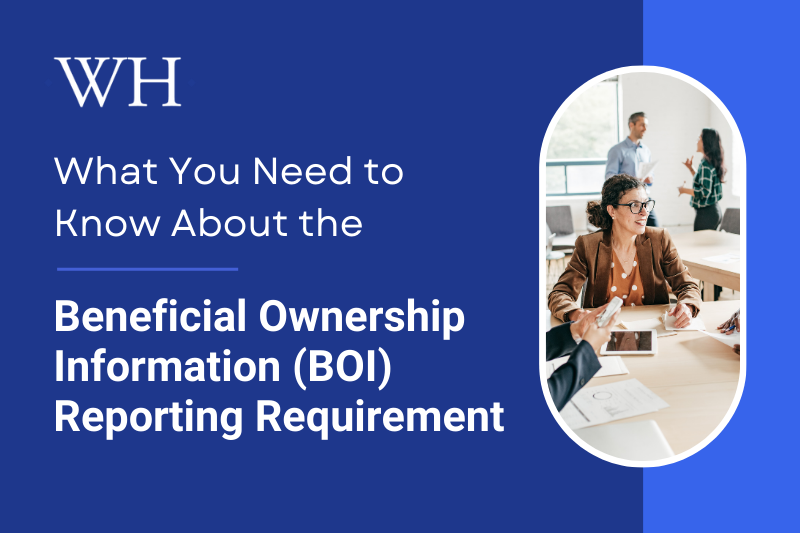
As a trusted accounting firm serving small and medium-sized businesses since 1981, Waters Hardy & Company is committed to keeping our clients informed about important regulatory changes. A new reporting requirement is set to impact most businesses operating in the United States, and we want to ensure you’re prepared. Let’s dive into the details of the Beneficial Ownership Information (BOI) reporting.
What is BOI Reporting?
The BOI reporting requirement stems from the Anti-Money Laundering Act of 2020. It mandates that most domestic U.S. entities and foreign entities operating within the U.S. must file a Beneficial Ownership Information Report (BOIR) with the Financial Crimes Enforcement Network (FinCEN).
Key Points to Understand:
- Deadline: Entities created before January 1, 2024, must file their BOIR by December 31, 2024. For entities created after January 1, 2024, and before January 1, 2025, the filing deadline is 90 days from the registration date.
- Who Needs to File: Most businesses and state LLCs are required to file. However, some entities, such as tax-exempt organizations, are exempt. You can check the full list of exemptions on the FinCEN website.
- Definition of Beneficial Owner: This refers to individuals who have substantial control or own 25% or more of the filing entity.
- Required Information: The report must include each beneficial owner’s full name, date of birth, residential address, and identifying document information. An image of the identifying document is also required.
- Accepted Identifying Documents: These include state-issued driver’s licenses, state/local/tribe-issued IDs, U.S. passports, or foreign passports.
- Filing Process: The BOIR can be filed online or uploaded as a PDF to the FinCEN website. No login creation is necessary for filing. For a quick overview of the filing process, you can watch this 5-minute YouTube tutorial.
- Penalties: Failure to file on time can result in a fine of $500 per day, with potential additional civil or criminal penalties.
Why is This Important?
Compliance with BOI reporting is crucial for maintaining good standing with regulatory authorities. It’s part of a broader effort to enhance transparency in business ownership and combat financial crimes.
How Can Waters Hardy & Company Help?
As your trusted financial advisors, we’re here to assist you with this new requirement. Our team of experienced CPAs has been staying abreast of these regulatory changes and is well-equipped to guide you through the process. We can file the Beneficial Ownership Information Report on your behalf, ensuring accuracy and timely submission. Our in-depth understanding of various business structures allows us to navigate complex ownership arrangements efficiently. Our service fee starts at $250 per report, with additional charges based on ownership structure complexity or information gathering needs.
Next Steps to Take
- Determine if your business is required to file a BOIR.
- Gather the necessary information for all beneficial owners.
- Decide whether to file the report yourself or seek professional assistance.
- Mark your calendar with the appropriate deadline based on your entity’s creation date.
At Waters Hardy & Company, we’re committed to helping you navigate these new regulatory waters. Whether you need assistance with BOI reporting or have questions about how this might impact your business operations, we’re here to provide expert guidance.
Remember, staying compliant isn’t just about avoiding penalties—it’s about maintaining the integrity and reputation of your business. Let us help you ensure your business remains in good standing while you focus on what you do best: growing your company.
For more information or to schedule a consultation about BOI reporting, please contact our office. We’re here to help you succeed in an ever-changing regulatory landscape.
